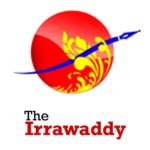 Last year, as Rohingya Muslim men, women and children ran from their burning villages in the western Rakhine state of Myanmar [aka Burma] an alarmed world turned to the internet for news. Some looked at The Irrawaddy, a publication named after the country’s signature river, which has been a pillar of journalistic probity since the student activist Aung Zaw founded it in 1993, The FT’s John Reed writes:
Last year, as Rohingya Muslim men, women and children ran from their burning villages in the western Rakhine state of Myanmar [aka Burma] an alarmed world turned to the internet for news. Some looked at The Irrawaddy, a publication named after the country’s signature river, which has been a pillar of journalistic probity since the student activist Aung Zaw founded it in 1993, The FT’s John Reed writes:
The website, which publishes in English and Burmese, has covered all of Myanmar’s big moments, from the “Saffron Revolution” in 2007 to Cyclone Nargis in 2008 to the triumph of Aung San Suu Kyi’s National League for Democracy in 2015. … But while the western press covered the violence widely, regular readers of The Irrawaddy’s English-language website noted some puzzling changes. The publication, which had previously been criticised by nationalists for its robust reporting on the persecuted minority, had started to label them as “self-identifying Rohingya”.
 As the refugees continued to pour into Bangladesh — their number would reach nearly 700,000 by early 2018 — international outrage spread, and with it calls to censure Aung San Suu Kyi, Myanmar’s civilian leader. But The Irrawaddy defended her, Reed adds:
As the refugees continued to pour into Bangladesh — their number would reach nearly 700,000 by early 2018 — international outrage spread, and with it calls to censure Aung San Suu Kyi, Myanmar’s civilian leader. But The Irrawaddy defended her, Reed adds:
The publication isn’t alone in taking a more patriotic tone; other Burmese news sites with which it competes, including Mizzima and DVB, run coverage that often reflects a nationalist mindset. ….“The Irrawaddy have switched over and aligned themselves with the prevailing narrative; they used to be independent and strongly in favour of democracy,” Khin Zaw Win, (left), one of the few political commentators in  Myanmar to have bluntly criticised Aung San Suu Kyi’s government on the Rohingya and other issues, told me. “There is a struggle, a debate going on in the media, and the majority of the public feel this way.”
Myanmar to have bluntly criticised Aung San Suu Kyi’s government on the Rohingya and other issues, told me. “There is a struggle, a debate going on in the media, and the majority of the public feel this way.”
“The Irrawaddy’s reluctance to challenge the government narrative on the Rohingya crisis is very disappointing, but it represents a much broader failure of the pro-democracy movement — both inside and outside the NLD — to honour human rights principles in the face of dehumanising narratives of ‘illegal immigration’ and terrorism,” said Ben Dunant, a former English-language editor, told me. The paper, he took pains to add, remains “a relatively moderate voice on the crisis” in Rakhine, and has done “great work” in reporting on military abuses in other parts of Myanmar.







